语料库辅助EFL自主学习的多维探索 第1章
- 格式:ppt
- 大小:2.47 MB
- 文档页数:32
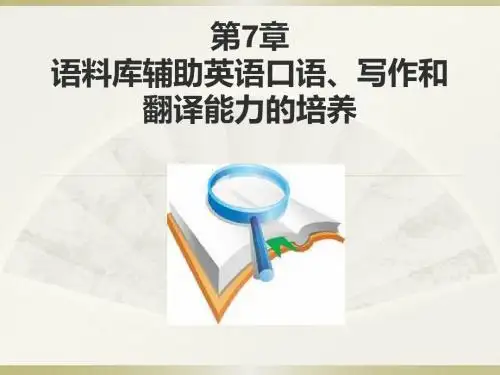
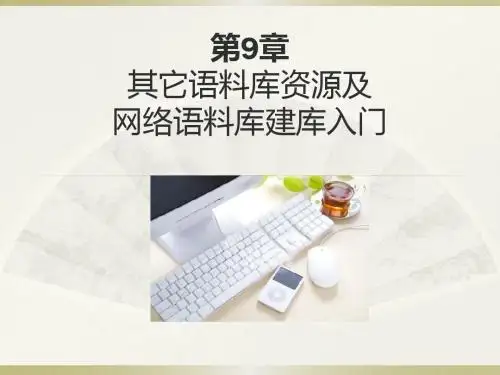
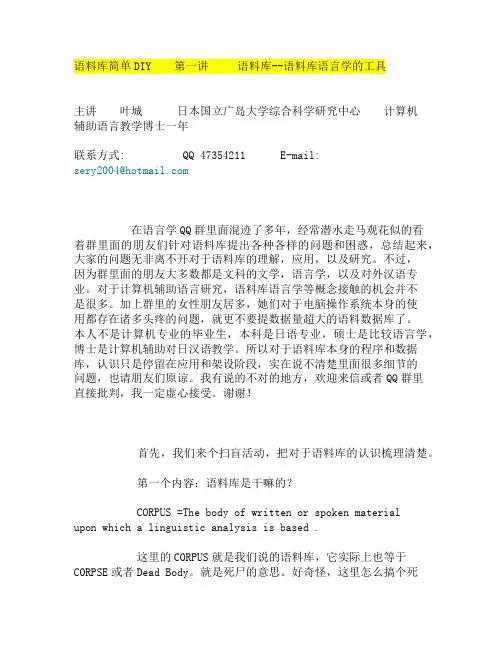
语料库简单DIY 第一讲语料库--语料库语言学的工具主讲叶城日本国立广岛大学综合科学研究中心计算机辅助语言教学博士一年联系方式: QQ 47354211 E-mail: sery2004@在语言学QQ群里面混迹了多年,经常潜水走马观花似的看着群里面的朋友们针对语料库提出各种各样的问题和困惑,总结起来,大家的问题无非离不开对于语料库的理解,应用,以及研究。
不过,因为群里面的朋友大多数都是文科的文学,语言学,以及对外汉语专业。
对于计算机辅助语言研究,语料库语言学等概念接触的机会并不是很多。
加上群里的女性朋友居多,她们对于电脑操作系统本身的使用都存在诸多头疼的问题,就更不要提数据量超大的语料数据库了。
本人不是计算机专业的毕业生,本科是日语专业,硕士是比较语言学,博士是计算机辅助对日汉语教学。
所以对于语料库本身的程序和数据库,认识只是停留在应用和架设阶段,实在说不清楚里面很多细节的问题,也请朋友们原谅。
我有说的不对的地方,欢迎来信或者QQ群里直接批判,我一定虚心接受。
谢谢!首先,我们来个扫盲活动,把对于语料库的认识梳理清楚。
第一个内容:语料库是干嘛的?CORPUS =The body of written or spoken material upon which a linguistic analysis is based .这里的CORPUS就是我们说的语料库,它实际上也等于CORPSE或者Dead Body。
就是死尸的意思。
好奇怪,这里怎么搞个死尸进来呢?其实这个概念是在构造主义时期1956年由英国的语言学会提出来的。
他们认为,人类研究语言的时候,需要诸多实体例子,这样的例子最好是最纯净的,最朴实的,甚至是最低俗低劣但是最普及的。
并且我们需要一个庞大的地方放置我们日常的言行,报纸杂志上刊登的新闻,以及各种各样的文学体裁等等。
而放置这些语言信息的地方,则被称为没有活力没有变化没有生机勃勃,像停尸房一样的地方----语料库。
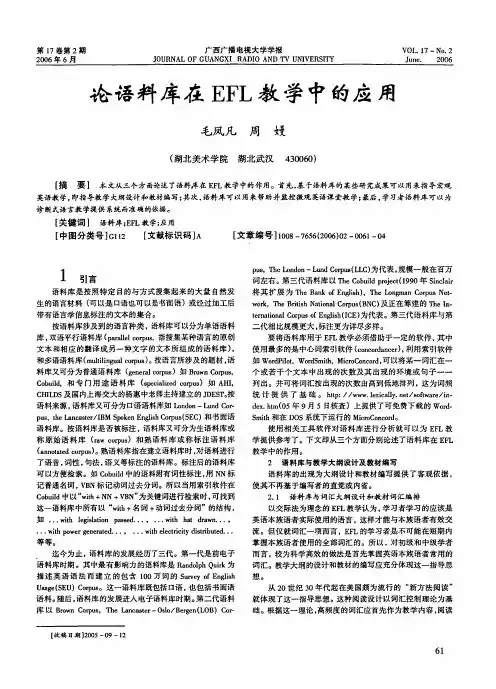
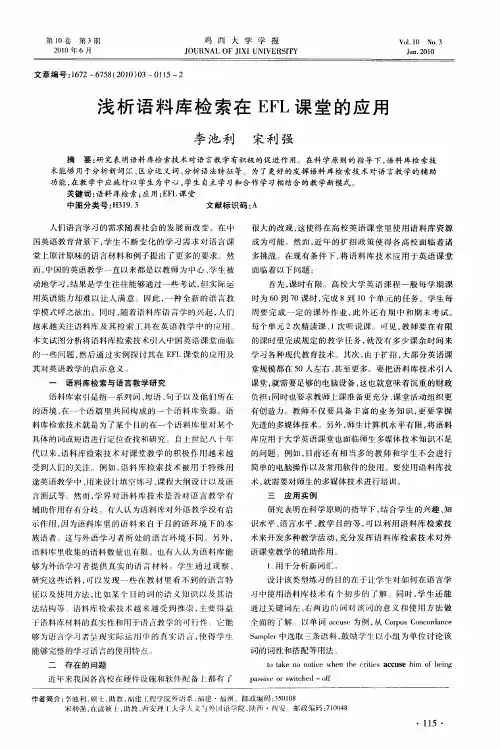
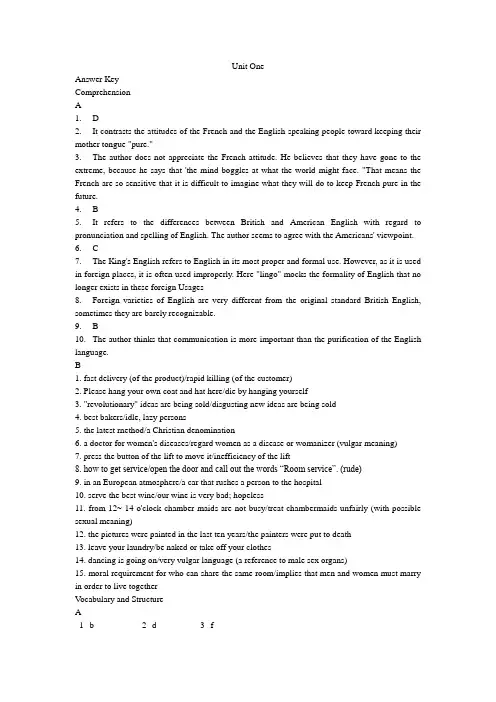
Unit OneAnswer KeyComprehensionA1. D2. It contrasts the attitudes of the French and the English-speaking people toward keeping their mother tongue "pure."3. The author does not appreciate the French attitude. He believes that they have gone to the extreme, because he says that 'the mind boggles at what the world might face. "That means the French are so sensitive that it is difficult to imagine what they will do to keep French pure in the future.4. B5. It refers to the differences between British and American English with regard to pronunciation and spelling of English. The author seems to agree with the Americans' viewpoint.6. C7. The King's English refers to English in its most proper and formal use. However, as it is used in foreign places, it is often used improperly. Here "lingo" mocks the formality of English that no longer exists in these foreign Usages8. Foreign varieties of English are very different from the original standard British English, sometimes they are barely recognizable.9. B10. The author thinks that communication is more important than the purification of the English language.B1. fast delivery (of the product)/rapid killing (of the customer)2. Please hang your own coat and hat here/die by hanging yourself3. "revolutionary" ideas are being sold/disgusting new ideas are being sold4. best bakers/idle, lazy persons5. the latest rnethod/a Christian denomination6. a doctor for women's diseases/regard women as a disease or womanizer (vulgar meaning)7. press the button of the lift to move it/inefficiency of the lift8. how to get service/open the door and call out the words “Room service”. (rude)9. in an European atmosphere/a car that rushes a person to the hospital10. serve the best wine/our wine is very bad; hopeless11. from 12~ 14 o'clock chamber maids are not busy/treat chambermaids unfairly (with possible sexual meaning)12. the pictures were painted in the last ten years/the painters were put to death13. leave your laundry/be naked or take off your clothes14. dancing is going on/very vulgar language (a reference to male sex organs)15. moral requirement for who can share the same room/implies that men and women must marry in order to live togetherV ocabulary and StructureA1--b 2--d 3--f4—j 5—I 6--hB1. sensitive2. list3. prevalent4. deficiency5. withheld6. certainty7. functional 8. confronte 9. courtesy10. spared 11. stroke 12. ambitious13. purified 14. highlights 15. noveltyC1. A. sensitive B. sense C. sensitivity2. A. compulsory B. compulsion C. compulsory3. A. Lease B. lease C. leasing4. A. deviate B. deviantly C. deviation5. A. prevalence B. prevalent C. prevalent6. A. deficient B. deficiency C.deficient7. A. extracts B. extracting C. extracted8. A, confronted B. confrontation C. confronted9. A, spare B. spare C. spare10. A. stroke B. stroking C. strokeD1. C. make alternative2. B. of taking advantage3. C. of a head injury4. D. remains5. A. accepted6. A. as much energy as7. C. would end up 8. C. has been9. B. or 10. D. with whichE1. language2. associates3. in-laws4. total5. responds6. swell7. Hardly8. lives9. dreams 10. aloud 11. ourselves 12. so13. distinguishes 14. humanity 15. makes 16. expressed17. source 18. newborn 19. act 20. traditionSpeaking(Open)Translation and Writing在过去,当探险者或商人们走出家园到外面的世界去寻找新的领地、市场或原材料资源时,他们通常与跟他们打交道的当地人说的不是同一种语言。
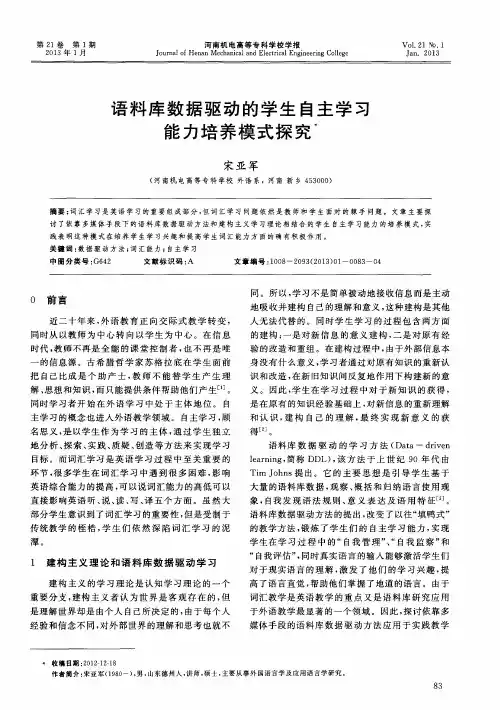
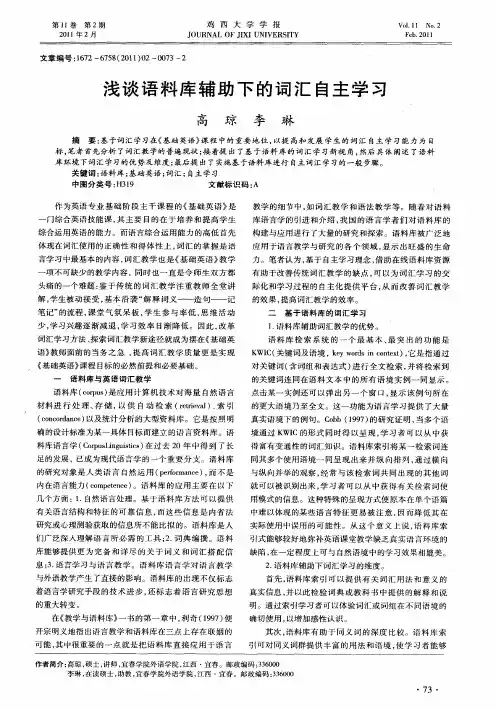
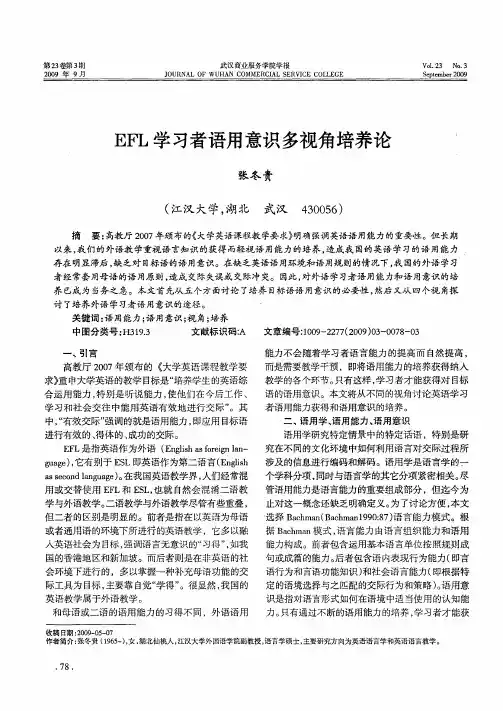
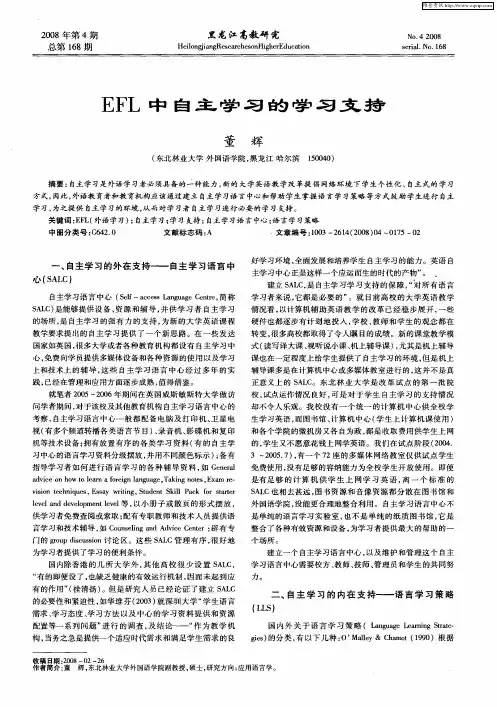
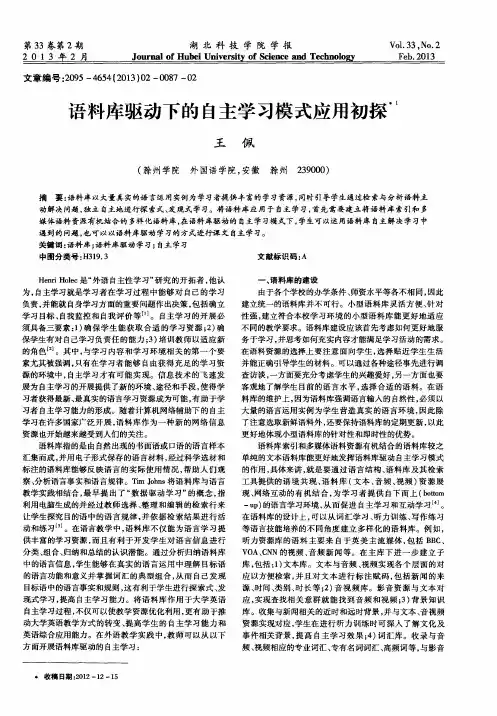
基于语料库的英语词汇自主学习摘要:本文围绕基于语料库的英语词汇自主学习展开,大型电脑语料库的发展给词汇自主学习提供一个崭新的模式。
本文论述了基于语料库的英语词汇自主学习的可行性,并对利用语料库进行英语词汇自主学习的方式提出了几项建议。
关键词:语料库词汇学习自主学习词汇量的大小是衡量英语学习者水平高低的重要指标之一。
在传统的英语词汇教学中,教师往往认为词汇方面的学习是学生自己课下应完成的任务,在课上指导的较少,而学生对于词汇的学习常常是费时费力而成效甚微。
近二十年来,外语教育正向交际式教学转变,同时从以教师为中心转向以学生为中心。
学习者开始在外语学习中处于主体地位。
自从自主学习的概念进入外语教学以来,它开始受到越来越多的国内外学者的的关注。
语料库作为一种辅助性工具应用于语言教学,还是应用语言学中一个新兴的研究领域。
它收集了大量真实的语言材料,运用先进的检索软件,使得对数量庞大的语言数据进行快速分析成为可能。
而语料库夜成为了语言学习者一种自主学习的模式。
一、基于语料库的英语词汇自主学习的可行性自主学习(autonomy/self-assess/independent learning)这一概念由来已久,很多学者都对它的概念进行了界定。
holec (1981)认为自主学习就是“可以自己学习的能力”(the ability to take charge of one’s own learning); dickinson (1987 )将自主学习定义为“在学习中学习者完全自己负责和决定并应用这些决定”(situation in which the learner is totally responsible for all the decisions concerned with him or her learning and the implementation of those decisions.); little (1997)认为自主学习“基本是学习者的心理与学习过程和内容的一种联系”(essentially a matter of the learner’s psychological relation to the process and content of learning)。
Unit 1 travel language旅行通用语The Academie Francasie has for decades been the watchdog over the French language. A few years ago, French sensitivity to the influx of English words became so great that law for the purification of French was adopted. The law covers even technical applications. For example, in theory, it is now compuslory in France to refer to the Boeing 747 as a gros-porteur, leasing as credit-bail, etc. the list is very long and detailed and applies to all facets of life. Mr. Chirac, the French President, might well expand on this list and come up with some new French terms for words such as "internet" or "byte stream" just to name a couple. The mind boggles at what the world might face. 数十年来,法兰西语言研究院一直保卫着法语的尊严。
几年前,由于法国人对英语词汇的入侵非常敏感,该机构颁布了净化法语的法律,其内容甚至涉及专业术语。
就拿波音747 (Boeing747)来说吧,现在法国人必须用法语词gros-porteur;表示出租的leasing 也变成了credit-bail。
在EFL教室里提升学生的自主学习作者:刘艳龄来源:《学校教育研究》2016年第08期随着社会生活的信息化和经济生活的全球化,作为一门越来越重要的交际语言,英语在日常生活中发挥着举足轻重的作用。
越来越多的学生意识到这种文化需求,将其作为一种能力和机会,试着去掌握这种国际语言。
然而,在经过十年的英语学习之后,仍然有很多的学生不太会听,说,读,写。
无疑,引起无效的英语教学的因素有很多,如缺乏语言环境,过重的课程负担以及应试教育系统等。
但在我看来,最主要的因素是僵硬的传统填鸭式教学模式。
受到这种模式的影响,学生过于依赖老师,没有老师的指引,他们不知道怎样利用他们的时间去自主地学习,不能明确他们的学习目标,不会选择合适的资料去达到这个目标,更不用说独立地继续这个毕生的学习。
近年来,根据《基础教育课程纲要》的精神,结合英语学科自身的特点,国家教育部制定了新课程标准。
《标准》体现的基本理念之一是:优化学习方式,提高自主学习能力。
加拿大语言教学专家斯特恩曾指出,第二外语教育应该能够使学生发展他们的自主学习能力,即“给予他们能力去帮助他们自己继续独立地学习”。
越来越多的英语教师意识到提高学生自主学习能力的重要性并作出很大的努力去改进。
而课堂教学是一个训练的过程,它应该提供学生机会去发展他们的自主学习能力,使得他们的潜力得以发挥。
在这篇论文里,我会陈述我对关于英语课堂学生的自主学习能力发展的三个方面因素的理解。
一、设定实用和有意义的目标由学生自己设定目标是走向自主学习的第一步。
学习的目的是一个人的渴望的结果,是他的方向和目标。
如果学生在他们的脑中有一个明确而一致的目标,他们会有内在的动机去更好地利用时间努力学习,全力发挥他们的潜力。
因此学生需要学习怎样设定对他们有益的目标。
首先,目标应该是实用并与他们的课程要求和他们的缺点一致的。
如果目标设定得太高、太低,或与他们的需求结果不相关的,学生的努力就会白费。
其次,目标应该是有意义的,有意义的学习应在原有的结构和储存系统里注入新的信息,能够确保学生从所学中联系他们已知的东西,以使整个学习过程有意义。